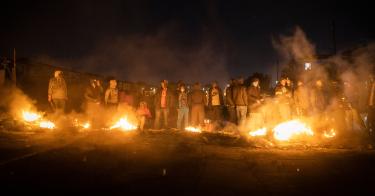A week of widespread rioting and looting in South Africa has ended. The turmoil’s cost is still being determined, but at least 276 people died, some of them trampled to death in stampedes, and the economic damage will run to billions of dollars. The country’s health infrastructure, already tottering under the weight of the Covid-19 pandemic, was virtually shattered in some areas by looting and arson. Major highways and a rail link were shut down for days.
The riots are barely over, so determining their “what” and “why” is difficult. The trigger was the jailing of the country’s former President Jacob Zuma, who was detained for ignoring a summons to appear before a commission investigating corruption. He has good cause to fear an inquiry. During his nine-year tenure, the country may have lost more than $34 billion to graft, according to his successor, President Cyril Ramaphosa. One of the most infamous scandals involved allegations that members of the wealthy Gupta family purchased so much influence with Mr. Zuma that they bartered cabinet positions in his government.
The deeper causes behind the unrest are murky. As with all South African presidents since the end of apartheid in 1994, Mr. Zuma was also head of the ruling African National Congress. The corruption scandals that embroiled him and the recession-prone economy over which he presided eventually made him a political liability, and the ANC forced him out in 2018. Yet a bloc of Zuma loyalists has continued to battle for power with Mr. Ramaphosa. Mr. Zuma’s arrest was a victory for Mr. Ramaphosa, as was the earlier suspension from the party of one of Mr. Zuma’s powerful allies.
The Ramaphosa government pins blame for the turmoil on Zuma supporters. Last week authorities said they had identified 12 ringleaders of what Mr. Ramaphosa called a “deliberate, coordinated and well-planned attack” on South Africa’s democracy. There may be a kernel of truth to that. Some pro-Zuma voices openly agitated for violence, and some of the attacks on infrastructure appeared to be coordinated.
Yet the scale and intensity of the unrest reveals a deeper problem. Mr. Ramaphosa’s political enemies could not have set parts of South Africa ablaze without the tinder provided by the ANC’s decadeslong mismanagement of the country. The ANC-led government’s bumbling during the HIV epidemic in the late 1990s and early 2000s likely cost more than 330,000 South African lives. Its aggressive affirmative action program, Black Economic Empowerment, has enriched a small clique of wealthy black South Africans while deterring investment. The 30% unemployment rate is essentially unchanged since 1994, and youth unemployment has climbed to a disastrous 74%. Blackouts, in Africa’s most industrialized economy, are common.
Some of the economic problems are related to the corruption the ANC indulges. Mr. Zuma’s arrest was remarkable mostly because senior ANC officials are so rarely punished for the industrial-scale theft some of them commit. The $34 billion that allegedly went missing during Mr. Zuma’s tenure was equal to about a tenth of South Africa’s gross domestic product—a devastating loss in a country where many are still impoverished. Officials have looted and otherwise mismanaged state-owned companies to the point that their debt encumbers the entire economy. Even Covid-19 relief funds haven’t been safe from theft by government officials.
It is possible the outpouring of anger and criminality last week will cause the ANC to take a hard look at itself. Mr. Ramaphosa vows to tackle corruption and make his country friendlier to investment, though he has overseen few significant reforms. If a lack of control over his party has obstructed his agenda so far, then his opportunity may have finally arrived. He could emerge from this crisis with greater levels of support from South Africans disgusted with the violence and with his ANC foes discredited, giving him the political capital to try to root out graft. A key indicator of his intentions will be whether he pushes for reforms requiring the ANC to relinquish some of its control over the economy, such as by breaking up and privatizing the state-owned enterprises.
There is the danger that the ANC takes an alternative route and uses the crisis as justification to intervene even further in the economy. There is a strong statist current in the ANC—its 2015 policy document proclaimed that the party should view the Chinese Communist Party’s economic policy as a “guiding lodestar”—and it is even now considering controversial policies that could erode property rights and possibly frighten off investment when it is most needed. If it does, and if it continues to protect its corrupt members, expect further turmoil.
This piece originally appeared in Wall Street Journal on July 21, 2021



